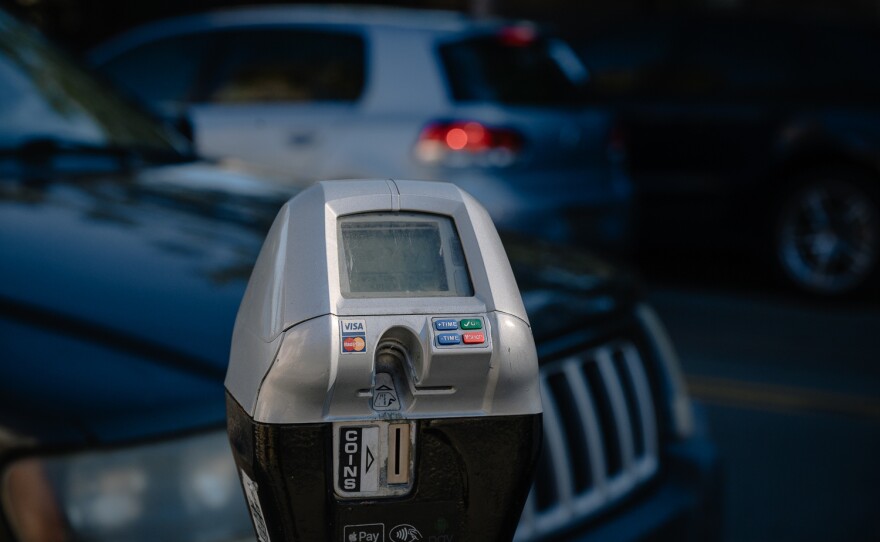It’s a slip of paper with the power to ruin your day.
Parking tickets are a fixture of life in San Diego, and most San Diegans have parking ticket stories of their own. Driving back and forth to find an open spot, forgetting to drop an extra quarter in the meter, or scoring a spot only to find it was a street-sweeping day.
In the past 10 years, the city of San Diego has handed out more than 5 million parking citations, which brought in nearly $300 million to the city’s general fund, according to a KPBS analysis of city data. The most common citations were:
- Violating street sweeping signs (1.1 million citations, $60 million in fines)
- Not displaying current registration (965,000 citations, $35.5 million in fines)
- Expired meters (637,000 citations, $27 million in fines)
- Parking in a red zone (255,000 citations, $19.8 million in fines)
- Not cramping wheels (214,000 citations, $12.8 million in fines)
The biggest hotspots for parking citations are Gaslamp and Mission Beach, which account for more than half of all tickets from 2012 to 2022. Some more facts about parking citations:
- The most common day to get a parking ticket is Thursday, which accounts for 19% of all citations in the last 10 years.
- The least common day is Sunday, which accounts for 2% of all citations.
- The top spot to get an expired meter ticket is in the 3600 block of 5th Avenue just north of Balboa Park, and four other blocks in the same area rank among the top 10. The next highest spot is the block on University Avenue in Hillcrest that houses Better Buzz Coffee and Gossip Grill.
- Cars in College Area collected a total of $330,000 in residential permit tickets on just Lindo Paseo and Mary Lane.
Kane Halloway said he only moved to Mission Beach three weeks ago, and has already gotten six or seven tickets.
“It’s just an extreme amount,” he said.
Halloway said the fear of tickets structures his day. He’s a tattoo artist in Mission Beach, and has to work on one tattoo for hours at a time, in an area where most businesses simply don’t have the space for employee parking.
“It’s very inconvenient to have to leave where I am to go move my car so that I don’t get a ticket,” he said.
Beachside areas across the city, like the neighboring Pacific Beach, also are high on the list for citations. Both Mission and Pacific Beach’s parking is mostly metered or only available for limited times.

But Sunny Lee, executive director of the business improvement district Discover Pacific Beach, said metered parking actually helps businesses.
“The businesses really want to see people turning over in the parking spaces that are right in front of their businesses, which is why the parking meters are going in, because then it allows for more visitors to those businesses,” Lee said.
But for visitors, it can be confusing. KPBS recently went to Mission Beach and met a family from Ohio who weren’t clear on the parking rules. The family parked their van at an unpainted curb on Mission Boulevard assuming it was good for the entire day, and said the signs were confusing.
Almost a quarter of all citations were for street sweeping, and a big chunk come from Mission Beach. During the past 10 years, the city collected $65,000 in street sweeping tickets just on Mission Boulevard in Mission Beach.
And that could increase even more in the coming years. In May 2022, the city announced it would bump street sweeping in Mission Beach from three days to four.

Mission Beach resident Bear Stoy said he got a ticket even though he rarely sees street sweepers.
“I’m just bummed, I got to pay off student loans and other bills to pay, and these tickets don’t really help out with that,” he said. “I don’t see too much street sweeping going on. I see the parking ticket guys out a lot, but that’s about it.”
Last year, the city made widespread changes to street sweeping schedules, reducing the frequency of street sweeping for some areas and increasing it in others, such as Clairemont, University City, and Mira Mesa, places that received more debris.
Street sweeping is needed to reduce the number of flies drawn to roadside trash and to stop trash from getting to the ocean, said city spokesperson Jose Ysea.
“Just because they don't see the street sweeper doesn't mean that it's not going to come through,” he said. “We need to be able to make sure that we have a predetermined time where all those cars are going to be cleared so that we can go in and sweep those streets. The city of San Diego is under a strict mandate to make sure that we're limiting the amount of debris and hazardous material flowing into our streets and streams and creeks and oceans.”
Money from parking citations goes into the city’s general fund, Ysea said, which funds public libraries, parks, and even parking enforcement.
While Mission Beach and other beachside areas of San Diego might see more street sweeping tickets, in downtown San Diego, parking tickets have always been a fixture of the streets.
Gaslamp Quarter boasts some of San Diego’s most iconic nightlife, restaurants and events. It also boasts the streets with the greatest number of parking tickets.
For instance, the 500 block of 4th Avenue received over 6,000 citations. And over the past decade, 5th Avenue has been the top place to receive a parking ticket at a meter. The city has collected nearly $1 million from expired meter citations on 5th Avenue alone.

But this might be changing. Since COVID-19, the city has blocked off portions of 5th Avenue to cars, creating the Gaslamp Promenade.
That could mean fewer parking tickets, said Michael Trimble, executive director of the Gaslamp Quarter Association.
“Before, it was a lot of people driving up and down 5th Ave looking for that magic spot that they could never find,” he said. “With all the parking we had up and down 5th Ave, we only took away 30 spaces. To replace it, we’ve tried to add spaces on 4th Ave, 5th Ave, and on the cross streets.”
Now that 5th Avenue is unavailable for parking on most busy nights, Trimble said customers and business owners benefit from more walking space and less congestion. However, the rest of downtown San Diego could have the same number, if not more, parking violations.
That means there’s no end in sight for San Diegans who continue to hope that they avoid another little slip of paper on their windshield.







